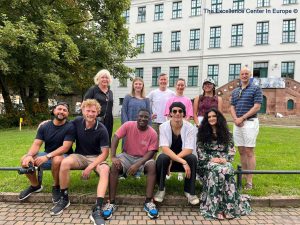Change in Halle over the past 5 years, particularly considering the city’s increased ethnic diversity
A brief history of Halle
Why has Halle’s ethnic diversity and population increased?
In 2015, Angela Merkel, the Chancellor of Germany, opened the borders of Germany to refugees with the idea of Willkommenskultur, translated as welcoming hospitality. From 2015 to 2016, more than 1 million asylum seekers entered Germany which is more than the total combined numbers in European countries Italy, France, Spain and the UK. Given Merkel’s policy, as well as the demand for a place of refuge in this world of suffering and unrest, ethnic diversity increased in Halle.
Halle has also grown due to the attraction of the university to students and academics. A 2015 policy limited movement from one of Germany’s 16 states to another unless with strict reason such as a job offer. Consequently, an influx of people also moved to Halle city centre from the countryside surrounding Halle. This movement has changed the demographics and ambiance of Halle.
How this change in population has affected the city: a report based off interviews with some residents of Halle.
The Arabic culture has become an influential part of Halle which can be seen visibly as one walks the streets. 5 years ago, in the entirety of Halle and neuStadt Halle, there were a mere 2 shops that sold Arabic food. This exemplifies the inaccessibility for local people to an important part of daily Arabic life; eating fresh and filling meals with friends. A myriad of Arabic shisha bars, barbers, grocery stores, tailors and restaurants have since been open. There are 10 to 15 Syrian restaurants alone. Within 5-minute walk from the Excellence centre you will find all of the above.
Previously, while there were more immigrants from Iraq and Iran, Syrians are among some of the peoples who have now enriched Halle’s ethnic diversity further and to a greater number; 5%, 7000 people, of Halle’s population are now Syrian. It is important to note that while Syrians, Palestinians, Jordanians, Lebanese and more share Arabic culture, just as individuals enrich an environment in a different way, their own countries’ cultures do also.
Immigrants’ integration
It is also reported that immigrants’ integration with general public life has increased and direct racism has decreased. Several interviewees reported feeling more comfortable and at home in Halle as the ethnic minority than they did in 2015. One referenced previously being elbowed in the street, and that this is no longer an issue.
The mosque, the holy Islamic place of prayer in NeuStadt Halle also known as the Islamisches KulturCenter, was founded before 2015 but has grown in popularity. In 2012, it had 200 members, and now that number stands at 1000. Moreover, a local hospital has since transformed a space into a spiritual centre which welcomes Muslims for prayer at any moment, encouraging acceptance and integration of Islam in central Halle.
Naturally as more Arabic people are residents in Halle, the language is more popular. Arabic can be studied at the Excellence Centre, but for locals, for instance, one can even have their driving lessons taught in Arabic.
Generally, Halle has grown in size and population, changing the ambiance of the city. It is reported that there is now a warm buzz of life in the evenings which was absent years ago. People are bustling about the city centre during the day.
Final remarks
A notable effort has been made by the Freiwilligen Agentur for cultural integration, as well as the likes of the Excellence center which was founded 8 months ago. Freiwiligen Agentur is a volunteering agency that connects people in Halle, for instance, with voluntary work in the cultural or creative field, but also specifically with integration in Halle. This ranges from Halle’s Café International to Asylverfahrenberatung fur Geluchtete (Asylum seekers advice) at the Amnesty International Hochschulgruppe.
Racism is prevalent in this world and exists also in Halle on a daily basis. Nonetheless, from interviews, it is clear that Halle has become a more homely place for minority ethnic groups over the past 5 years in its increased ethnic diversity and efforts from the community.



